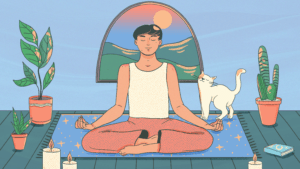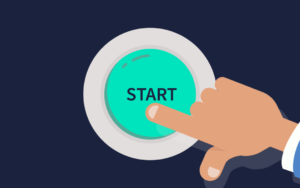Millions of people around the world suffer from stress and anxiety. While there are many different methods of treatment, one of the most effective is meditation. Meditation allows you to find peace within yourself and can help to reduce the amount of stress and anxiety that you feel daily. In this blog post, we will discuss how meditation can help to improve your mental health, as well as some tips on how to get started!
Contents
What Is Stress?
Stress is the body’s response to any demand. It can be caused by both good and bad experiences. When you feel overwhelmed, anxious, or unable to cope, your body goes into “fight-or-flight” mode. This triggers the release of stress hormones like adrenaline and cortisol.
These hormones increase your heart rate and blood pressure and give you a burst of energy. This response is meant to help you deal with dangerous situations, but it can also be triggered by more everyday things like work deadlines or traffic jams. Over time, if you’re constantly feeling stressed, this “fight-or-flight” response can take a toll on your body and lead to serious health problems.
What Causes Stress?
- Poor time management skills: When we don’t plan our time wisely, it can lead to a lot of unnecessary pressure and stress. Let’s say you have a big project due at work. You know it’s going to take a lot of effort to complete, but you keep putting it off because you don’t want to deal with it. As the deadline gets closer, the stress starts to build up until you’re finally forced to do the project in a rushed manner.
- Taking on too much at once: When we take on too much at once, our bodies and minds can become overwhelmed. This can lead to a feeling of being constantly stressed and even panicked. Our heart rate may increase, we may feel tightness in our chest and we may start to breathe more quickly.

- Not saying “no” when you need to: When you don’t say “no” to things that you don’t want to do, you end up feeling overwhelmed and stressed. This is because you are trying to please everyone else but yourself.
- Perfectionism Madness: The problem with perfectionism is that it is a never-ending cycle of self-criticism and comparison. We berate ourselves for our mistakes and compare ourselves to others who seem to have it all together. This constant state of dissatisfaction takes a toll on our mental and physical health.
- Worrying about what other people think: We might worry about what our friends or family think of us, or what strangers might think if they see us doing something embarrassing. This worry can cause a lot of anxiety and make it difficult for us to relax and enjoy ourselves. Furthermore, it causes a lot of insecurity and self-doubt.
All of these things lead to an increase in the level of the stress hormone, cortisol.
What Are The Consequences?
- High blood pressure: When we experience stress, our bodies go into fight-or-flight mode. This triggers the release of hormones like adrenaline and cortisol, which results in high blood pressure or hypertension.
- Heart disease: Stress is a well-known trigger for heart disease. When we’re stressed, our bodies go into “fight or flight” mode, releasing hormones like adrenaline and cortisol. These hormones increase our heart rate which can damage the arteries and lead to plaque buildup. Over time, this can lead to a heart attack.
- Diabetes: When we’re under stress, our bodies release a hormone called cortisol. However, when cortisol levels are constantly high, it can lead to insulin resistance – a condition where the body doesn’t properly use insulin to regulate blood sugar levels. This can eventually lead to type II diabetes.
- Anxiety: One of the most common mental health issues that can develop from chronic stress is anxiety. Anxiety is characterized by feelings of worry, nervousness, and fear. These feelings can be so intense that they interfere with daily activities.
- Depression: When we experience stress, our bodies release a hormone known as cortisol. However, when cortisol is constantly released due to chronic stress, it can lead to problems such as insomnia, and weight gain. In extreme cases, chronic stress can even lead to depression.
The above described are some of the major side effects of stress. Left untreated, they may take a toll on your health and life in the long run.
Meditation For Stress, The Ancient Cure
Meditation can be a great way to find inner peace and reduce anxiety. The goal of meditation is to focus your attention on the present moment and let go of all other thoughts. This can be done by focusing on your breath or a mantra.
Meditation can be done for as little as five minutes a day, but it is important to be consistent to see results. When you first start meditating, it is normal for your mind to wander. Just gently bring your attention back to the present moment without judgment. Over time, you will find that it becomes easier and easier to focus during meditation.
Additionally, there are many different types of meditation, so experiment until you find one that works best for you.
Types Of Meditation

Meditation can be a powerful tool for managing stress. There are many different types of meditation, and each one can offer distinct benefits. Here are some of the most effective meditations for reducing stress:
Mindfulness Meditation
Mindfulness meditation is all about being present in the moment and observing your thoughts and feelings without judgment. This type of meditation can help you become more aware of your stressors and learn to manage them more productively.
Breathing Meditation
Breathing meditation involves focusing on your breath and counting each inhales and exhale. This simple practice can help to slow down your racing thoughts and ease anxiety.
Visualization Meditation
Visualization meditation involves picturing yourself in a peaceful, relaxing environment. This can help to calm your mind and body and reduce stress.
Body Scan Meditation
Body scan meditation involves focusing on each part of your body, from your toes to your head. This type of meditation can help you become more aware of physical tension in your body and release it.
Loving-Kindness Meditation
Loving-kindness meditation involves repeating phrases of goodwill, such as “may all beings be happy and free.” This practice can help to increase feelings of compassion and reduce stress.
Transcendental Meditation
Transcendental meditation is a form of mantra meditation that involves repeating a mantra or word for 20 minutes twice per day. This type of meditation is particularly effective at reducing stress.
Guided Meditation
Guided meditation involves following along with a recorded voice or guided visualization. This can be a great option for beginners who are looking for some structure in their meditation practice.
Walking Meditation
Walking meditation is a form of mindfulness meditation that involves focusing on your breath and sensations while you walk. This type of meditation can be done anywhere, at any time, making it a convenient way to reduce stress.
Focused Meditation
Focused meditation involves focusing on a single object, such as a mantra, your breath, or a certain sound. This type of meditation can help to improve focus and concentration.
Open-Monitoring Meditation
Open-monitoring meditation involves observing your thoughts and feelings without judgment. This type of meditation can help you become more aware of your stressors and learn to manage them more productively.
Different types of meditation offer different benefits, so it is important to find the right one for you. If you are new to meditation, consider trying guided meditation or focused meditation. Once you have found a style that works for you, stick with it and make it part of your daily routine. The more you meditate, the more benefits you will experience.
Other Similar Techniques
There are a few other methods that function similarly to meditation. These are brand-new types of meditation that provide identical benefits to traditional meditation. Some of such examples include:
Qigong
This is a Chinese system of exercises that combine movement, breath work, and relaxation. Qigong is effective at reducing stress, improving sleep quality, and boosting immunity.
Yoga
Yoga is an ancient practice that combines physical exercise, breathing techniques, and meditation. It can help to improve flexibility, strength, and mental well-being.
Aromatherapy
Aromatherapy is the use of essential oils for healing purposes. Essential oils can be used in diffusers or applied topically. Aromatherapy is effective at reducing anxiety and promoting relaxation.
Tai Chi
This form of meditation is a Chinese martial art that involves slow, flowing movements. Tai chi reduces stress, improves balance and coordination, and boosts overall health.
Progressive Muscle Relaxation
Progressive muscle relaxation (PMR) is a stress management technique that involves tensing and relaxing different muscle groups in the body. PMR can help to release physical tension and reduce stress.
How Does Meditation Relieves Stress?
There are many benefits of meditation for stress, including:
- It helps clear your mind of distractions and focus on the present moment. You become aware of your thoughts and feelings.
- You become more mindful of your thoughts and emotions which helps you to manage stress more effectively.
- The ancient practice can also improve sleep quality, concentration, and pain tolerance.
- Meditation helps reduce anxiety by promoting relaxation and reducing stress hormones.
- Meditation is a simple and effective way to promote inner peace. You may be surprised at how much better you feel. Meditation can help you to find the inner peace and calm that you need to manage stress more effectively. You have nothing to lose and everything to gain.
Meditation can help you achieve all of these things by providing an escape from the constant chatter of your mind. It allows you to focus on the present moment and be at peace with yourself. Give it a try once and see the miracle yourself.
How To Get Started?
Meditation can be done anywhere at any time, you don’t need special equipment or clothing. Just find a comfortable position and focus on your breath. You can meditate for as little or as long as you like; even a few minutes of meditation can be beneficial.
- The goal of meditation is to simplify and bring clarity to your thoughts and emotions. To initiate the process, find a comfortable place to sit or lie down.
- Close your eyes and focus on your breath. inhale slowly and deeply through your nose, expanding your belly.
- Exhale slowly through your mouth, drawing your navel toward your spine. Continue breathing deeply and slowly for several minutes.
- As you meditate, you may notice the thoughts and emotions that arise in your mind. Don’t try to push them away; simply observe them without judgment or attachment. If you get caught up in thinking, simply return your focus to your breath.
If you’re new to meditation, it’s important to be patient and consistent. Meditation is a practice that takes time to learn and master. But with regular practice, you can learn how to control your thoughts and emotions and find inner peace.”
Remember, Meditation is a journey, not a destination. There will be days when it’s easy to meditate and days when it’s more difficult. But with practice, you’ll develop the ability to find inner peace and calm in any situation.
Start small and be patient as you learn how to meditate. Meditation is a skill that takes time to learn but can provide many lifelong benefits.
Conclusion
Meditation for stress is an effective way to find inner peace and reduce anxiety. It has not only a positive effect on the mind but also on the body. It is a simple and natural way to relax and rejuvenate oneself.
There are many different types of meditation, so it is important to find the right one for you. If you have never tried meditation before, you may start with guided meditation. Once you get the hang of it, you can try other types of meditation. Since the practice is suitable for anywhere and any time, there is no excuse not to try it. It could be the answer to your stress-related problems.
For more information, please contact MantraCare. Stress can have both physical and mental effects on the body, leading to negative consequences such as anxiety, depression, and even physical illnesses. If you have any queries regarding Online Stress Counseling experienced therapists at MantraCare can help: Book a trial Stress therapy session









